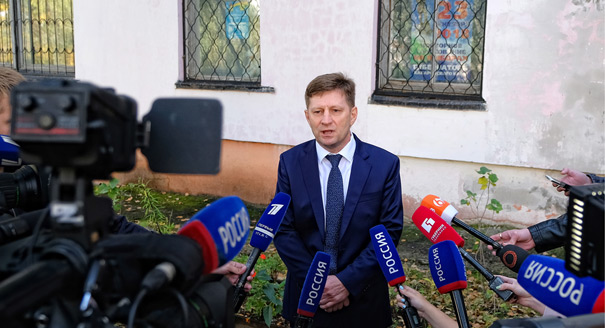Russia is still digesting what has been dubbed a “new political reality”—the strong protest vote in four of the 22 regions where gubernatorial elections were recently held. There have been predictions that the entire administrative system across the country could collapse, or that there will be a new political crackdown. Yet the true picture is more complex. After all, the governing party, United Russia, still managed to win a majority in the legislative assemblies of all sixteen regions.
The opposition victories—by Sergei Furgal in Khabarovsk, Vladimir Sipyagin in Vladimir, as well as the strong showings by Andrei Ishchenko in Primorsky Region and Valentin Konovalov in Khakassia, whose political fate has yet to be sealed—may not so much herald a “new political reality” as changing political landscapes in each place.
A protest vote is not a new phenomenon in these regions. This year’s events in Primorye bring back memories of the former Vladivostok mayor, Viktor Cherepkov—his dismissal, the protests, hunger strikes, and the cancellation of the election. In Vladimir, the elections are reminiscent of elections in 1996.
The upsets were also a vote for traditionalism and paternalism more than liberalism or modernization. Residents of the Far East are conservative—they are traditionalists and protectionists. Far Easterners see themselves as separate from the federal center, considering all land beyond Novosibirsk as “the West.” Opposed to change, they view Moscow’s initiatives as disruptions to their way of life and the region’s environment. The difficult living conditions of the Far East increase their material demands for higher salaries and labor union sanatoriums.
In Khabarovsk, Furgal appealed to this traditionalist and conservative mindset. Noting that “the Far East is a special land: life here is hard,” he campaigned for special protections and guarantees for living and working conditions for residents of the Far East.
The Vladimir region is equally conservative. Its residents hold that, as the birthplace of Russia, the region should be free from outside interference. Even in 1996, Vladimir voters snubbed the Kremlin’s candidate, Yuri Vlasov, a young technocrat, and instead elected Nikolai Vinogradov, the Communist challenger who headed the region for the next seventeen years.
What about populism and anti-establishment sentiment? Modern-day populism calls for more civic involvement in decisionmaking. The 2018 election was in part a success for this kind of populism—but only in municipal campaigns, which parliamentary opposition politicians ignore. In Yakutsk, Sardana Avksentyeva won the mayoral election by 8.3 percent with populist slogans such as “A Mayor for the People.” She called out abuses of the municipal budget and criticized the administration for its reluctance to tackle the city’s problems, emphasized her openness, and worked to differentiate herself from the traditional political class.
Furgal, the winner in Khabarovsk, is no populist. A two-term State Duma deputy, he comes from an establishment lineage of businessmen-cum-deputies, professional lobbyists, and local elites.
Ultimately, the rules of the game have not changed. A set of conditions that included aging politicians, political weariness after the March election, and discontent over recent reforms made it possible for these opposition candidates to win. In addition to the unpopular measures such as pension reform and changes to VAT, other controversial policies were imposed on Primorye and Khabarovsk, such as changes in crabbing quotas, triggering protests over the summer.
The victorious opposition candidates, while promoting neither populist nor modernist narratives, did not come out of nowhere. They offered a traditionalist, paternalist platform directed not at the urban electorate but at voters who support the status quo: retirees who want to maintain the distributive pension system and receive benefits.
Above all, candidates criticized pension reform. Furgal escalated the discourse by stating “dead men don’t need pensions,” while Ishchenko used the slogan “For Our Pensions!” Candidates also proposed to restore benefits, such as free public transportation in Khabarovsk and Primorsky regions.
Finally, candidates emphasized that their regions are unique and that elected officials must be local. They stressed that the world is not open, Russia is not homogenous, and regional development is not an interdependent process—a governor’s success depends on their local connections.
Sipyagin based his entire campaign on this kind of rhetoric, declaring that his opponent, Orlova, should go back to her own land and raise her grandchildren there. Russia has not seen such an openly sexist campaign in recent memory, one that even included the newspaper headline “Don’t Let Broads Rule the City of Vladimir.” In traditionalist Russian regions, peddling machismo is acceptable and even admired.
The governing regime is facing the challenge of a paternalist narrative that harks back to the 1990s, advocating distribution, traditionalism, regionalism bordering on isolationism, and even sexism. As the latest reforms have stripped the president and United Russia members of their status as leading social conservatives, the winning ideological narrative of this new Establishment 2.0 phenomenon is Chavismo, Russian style.
So, Furgal and Sipyagin’s victories do not threaten the stability of the political system, but they jeopardize Putin’s attempt to reorient citizens toward facing the challenges of the twenty-first century. As for the more individualist voters who do not rely on state support, they did not show up at the polls in the regions where the “new political reality” was supposedly born. This was a triumph for a different kind of ideology.






.jpg)
